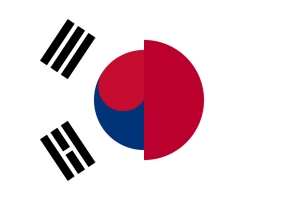By Daniel Nardini
 So far, the military alliances between the United States and South Korea and Japan are still holding. Both South Koreans and Japanese see a necessity for such military alliances no matter what the disputes may be with the United States in terms of trade deals or questions of investments in each others’ countries. Military cooperation is still the key for all three countries. All three know that a heavily militarized North Korea and China could not only disrupt the whole security and safety of East Asia, but also lead to serious danger for the United States territories of Guam, Northern Mariana Islands, American Samoa, and even the state of Hawaii if the alliances between the United States and South Korea and Japan fall apart. At this point, despite the unstable nature of the Trump presidency, the alliances in East Asia are still holding.
So far, the military alliances between the United States and South Korea and Japan are still holding. Both South Koreans and Japanese see a necessity for such military alliances no matter what the disputes may be with the United States in terms of trade deals or questions of investments in each others’ countries. Military cooperation is still the key for all three countries. All three know that a heavily militarized North Korea and China could not only disrupt the whole security and safety of East Asia, but also lead to serious danger for the United States territories of Guam, Northern Mariana Islands, American Samoa, and even the state of Hawaii if the alliances between the United States and South Korea and Japan fall apart. At this point, despite the unstable nature of the Trump presidency, the alliances in East Asia are still holding.
One very dangerous dark cloud is the political extremism growing in both South Korea and Japan. In South Korea, the Democratic Party of Korea has come to power. They control the executive branch as well as the legislative branch and to a good extent the judicial branch. The Democratic Party of Korea is politically left, and they have a pro-North Korea, anti-Japan stance in their platform. This bias has been a a problem for the U.S.-South Korea military alliance in the past, and just might be one for the near future. More worrisome is how it will affect diplomatic relations with Japan. The political left in South Korea is especially xenophobic towards Japan and everything Japanese. This xenophobia could affect trade and even military cooperation between South Korea and Japan.
On the Japanese end, right wing ultra-nationalism is becoming an issue. A fairly new party, the Sanseito, was founded in 2020 on the platform that the whole Covid-19 pandemic was a hoax. It has since morphed into an anti-foreigner, anti-Korean, and pro-imperialist party calling for a “Japanese First” policy. This movement is running under the platform that foreigners are the ones causing all of the problems in Japanese society today, and there are too many foreigners in Japan today. Foreign residents of Japan only account for three percent of the population, but lies, misinformation and outright Japanese xenophobia seem to be the hallmarks of this movement.
As I said, this movement is also anti-Korean, and it has joined other extreme right wing ultra-nationalist movements in Japan calling for the restoration of the Japanese Empire that existed before World War II. One source of contention that remains are the Dokto Islands that South Korea not only claims but also occupies today (having taken them over in 1954 and held on to them ever since). The Japanese also claim these islands, and have made threats of taking them back. Back in 1996, the Japanese threatened to land on these islands. It nearly became a flash-point between the two countries. The United States intervened and cooled things down. But this and other issues between South Korea and Japan have never been resolved. Even though both South Korea and Japan have a long history of animosity between each other, they also have an important trade relationship that has grown over the decades.
The greatest danger is for the military alliances with the United States to fall apart over their sharp political differences that I have outlined. If the military alliances fall apart, then the danger to them as well as the United States could be catastrophic. Worse, we could see the rise of a potentially dangerous and unstable new Japanese Empire and South Korea could cast in its lot with China in reaction. The only good news is that so far this is unlikely because ninety percent of all South Koreans still want to keep the U.S.-South Korea military alliance because they mistrust China. Koreans in general have had a long mistrust with China over the centuries, and they are well aware of China’s territorial ambitions. The key is to keep the extremist nature in both South Korean and Japanese politics from rising to the fore and becoming the driving forces in the balance of power in East Asia that could change everything forever not just in Asia but the whole world.
 Des Plaines Man Charged with Possession of Child Pornography February 26, 2026
Des Plaines Man Charged with Possession of Child Pornography February 26, 2026
 Rogers Park Announces Annual North Side Restaurant Week February 26, 2026
Rogers Park Announces Annual North Side Restaurant Week February 26, 2026 Pappas Says Pay Property Tax Bills Online Now February 26, 2026
Pappas Says Pay Property Tax Bills Online Now February 26, 2026 New Bill Seeks to Bar DHS from Using Full-Body Restraints February 26, 2026
New Bill Seeks to Bar DHS from Using Full-Body Restraints February 26, 2026




The Danger of Political Extremism
By Daniel Nardini
One very dangerous dark cloud is the political extremism growing in both South Korea and Japan. In South Korea, the Democratic Party of Korea has come to power. They control the executive branch as well as the legislative branch and to a good extent the judicial branch. The Democratic Party of Korea is politically left, and they have a pro-North Korea, anti-Japan stance in their platform. This bias has been a a problem for the U.S.-South Korea military alliance in the past, and just might be one for the near future. More worrisome is how it will affect diplomatic relations with Japan. The political left in South Korea is especially xenophobic towards Japan and everything Japanese. This xenophobia could affect trade and even military cooperation between South Korea and Japan.
On the Japanese end, right wing ultra-nationalism is becoming an issue. A fairly new party, the Sanseito, was founded in 2020 on the platform that the whole Covid-19 pandemic was a hoax. It has since morphed into an anti-foreigner, anti-Korean, and pro-imperialist party calling for a “Japanese First” policy. This movement is running under the platform that foreigners are the ones causing all of the problems in Japanese society today, and there are too many foreigners in Japan today. Foreign residents of Japan only account for three percent of the population, but lies, misinformation and outright Japanese xenophobia seem to be the hallmarks of this movement.
As I said, this movement is also anti-Korean, and it has joined other extreme right wing ultra-nationalist movements in Japan calling for the restoration of the Japanese Empire that existed before World War II. One source of contention that remains are the Dokto Islands that South Korea not only claims but also occupies today (having taken them over in 1954 and held on to them ever since). The Japanese also claim these islands, and have made threats of taking them back. Back in 1996, the Japanese threatened to land on these islands. It nearly became a flash-point between the two countries. The United States intervened and cooled things down. But this and other issues between South Korea and Japan have never been resolved. Even though both South Korea and Japan have a long history of animosity between each other, they also have an important trade relationship that has grown over the decades.
The greatest danger is for the military alliances with the United States to fall apart over their sharp political differences that I have outlined. If the military alliances fall apart, then the danger to them as well as the United States could be catastrophic. Worse, we could see the rise of a potentially dangerous and unstable new Japanese Empire and South Korea could cast in its lot with China in reaction. The only good news is that so far this is unlikely because ninety percent of all South Koreans still want to keep the U.S.-South Korea military alliance because they mistrust China. Koreans in general have had a long mistrust with China over the centuries, and they are well aware of China’s territorial ambitions. The key is to keep the extremist nature in both South Korean and Japanese politics from rising to the fore and becoming the driving forces in the balance of power in East Asia that could change everything forever not just in Asia but the whole world.